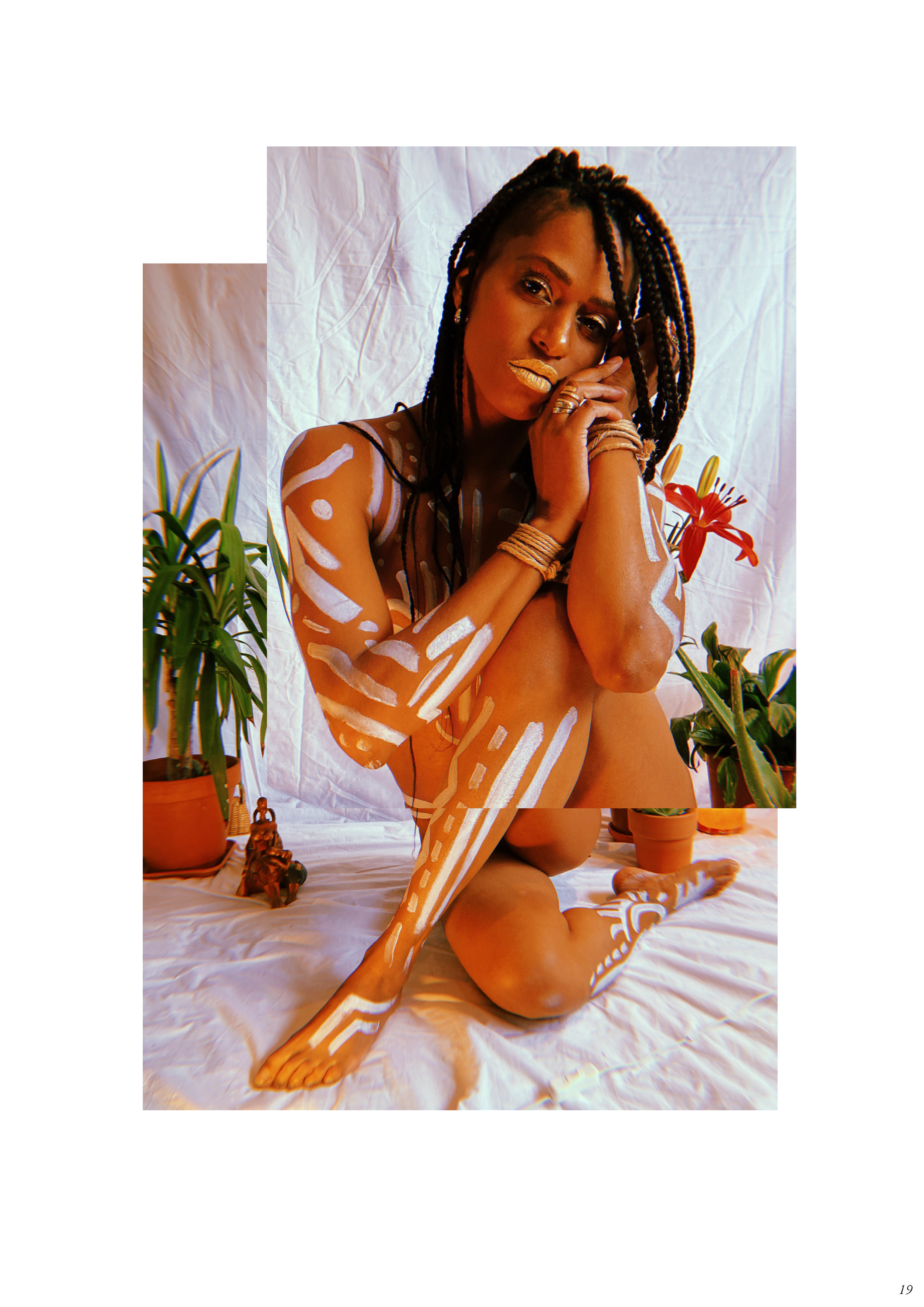Find Your Way Back
Photos by Vithoria Escobar Model: Alessandra Zevedo Collage by Valentina Alvarez
For a long time, I couldn’t pinpoint the way I felt around African women. Any African woman. Kenyan, Nigerian, Ethiopian it didn’t matter. I was mystified by these feelings because typically as a little Black girl in rural Maryland I found comfort in the presence of Black women. When I walked into rooms without my mother and saw at least one other face that looked like mine I felt less alone. This made me uneasy around African women as mysterious to me as their skin was like mine, their hair, and sometimes even the mannerisms they still felt foreign. They felt for me but not like me.
When I started college at a predominantly white university these feelings intensified. I watched gobs of brown and Black students move around campus in tight clusters creating their own community in the very white space. I had even made a game out of spotting another Black person in the crowd. I felt soothed by not being the only one, something my mother had drummed into me from an early age. On more than one occasion I would stand in the corner of a party with a red solo cup scanning the room, uncomfortable if I came to the realization that it was just me.
I noticed a difference between African American and Black American students in this environment. A lot of Black American students were doing what we had always been told to do. Assimilate and code-switch. We had spent our entire lives straddling the two worlds, believing a dichotomous existence is the only one we would ever know. We would never get the chance to just be American and most days weren’t sure if we wanted to anyway. Seeking validation from America as a Black woman is like seeking the affectionate touch from the hands of an abusive parent.
There would always be a qualifier and our skin would always enter a room before our background. We weren’t just the students, we were the Black students. I wasn’t just a girl, I was a Black girl. It was nothing for us to broach a topic on slavery or anything that involved Black people and oppression. The room does not so subtly turn towards me with wide eyes and eager liberal ears. I went to college less than a mile away from my high school and a twenty-minute drive from my childhood home. I knew a lot of these people and had known them for a long time. So, I was always disappointed but never shocked at how permanently etched into the category of “other” I was in their minds. Never mind that we had grown up watching the same shows, sat in the same cafeterias and our mothers had worked in the same offices. I was still “other” and talking to me, laughing with me, asking me about my hair and dancing, was like pulling back a curtain and taking a peek. Like when you live next door to someone for decades and finally get to see what the inside of their house looks like. We had learned it was not only important but essential for us to blend and not make people uncomfortable. People meaning white people. Straighten our hair, soften our wit, lighten our voices while not losing ourselves in the process. We had been doing it our entire lives and it felt no different than taking shoes off and putting them back on as you came and went to and from your house. I didn’t get this vibe from the African students on campus.
I listened to them mock their parents with affection, tongues suddenly becoming thick with accents. They had a connection to a homeland that I would never know. I was mad because the very soil in which I had grown despised me. As if my blood hadn’t helped till the land. I was jealous of how they effortlessly flitted between cultures, never forcing themselves to fit in because they had their own norms and roots as a touchstone. I was uneasy and nervous around them. Each interaction provokes those feelings of being one of them but not like them. After spending an obnoxious amount of time confused by my feelings toward these women, I linked it to a wisdom nugget given to me by my therapist. Anger is far easier to manage than hurt.
Initially, I thought I was mad. Mad for spending teen years trying to fit into the only culture me and my family had known for centuries and still being othered. As if what we were made of wasn’t woven into the fabric of America. Mad, I fried my hair, wore Hollister jeans that weren't made for my body, and bought a cheap drugstore foundation that skipped from medium tan to deep. Mad because, as a Black woman, I never felt like I had a place despite standing in the middle of the only place I had ever known. I was mad when I saw them because I felt like I was them twice removed. Their stories of immigration were filled with grit, glory, opportunity, and circumstance. Uprooted but with the soil of their homeland stuck to the bottom of their feet or at least the feet of their parents.
Ours didn’t feel like an uprooting but a savage chopping off at the roots, in hopes of filling a cruel garden full of transplants tended by an oppressive thumb. I resented what I believed was their cocky arrogance and thumbing of their nose at Black American paltry offerings of culture. Anger is far easier to manipulate and control than hurt. I thought I was mad. Truthfully, I was hurt because for the first time in my life I realized that the world had stolen from me, something that they could never give back and punished me for it in the process.
Spoken Black Girl Magazine is back with a new issue! This time our theme is “Diaspora”. Enjoy essays, letters, poetry, photography, and artwork from powerful new voices in our community!
This issue features work by: Erika DeShay "Black Lives Matter", Adrienne Prather " Hear our Ancestors Roar", Tsebiyah Derry "Earth is Home", Donauta Watson "How to Drink Water from a Coconut Without a Straw", Sherese Francis "How Can You See in the Dark? (EnTalechy of a Diasporic Misfit)", Angela Miskis "Inside my Lungs", Kristin Jere " The Things That I Love About Wash Day", Elizabeth DeHaan "I am a Child of the Diaspora", Krystal Camacho "Dear Abuela", Eunice Brownlee "Lost Heritage", Rowana Abbensetts-Dobson "Novel Excerpt: Departure Story", Maholin Navarro "The Venezuelan Diaspora", Mari Corona "Who is Responsible? The Race Cards are on the Table", Lauren Morton "Find Our Way Back"
Photography By: Adeline Nieto (Cover Photo Image, Design by Valentina Alvarez), Valentina Alvarez, Steven Jermaine, Vithoria Escobar
Artwork By: Monifa Kincaid “Her Black Body” / “She Still Hears Me” / “Acceptance”, "Maho" Portrait by David Booth
Layout and Design: Valentina Alvarez
Publication Date: May 15
All Orders Ship in June.


